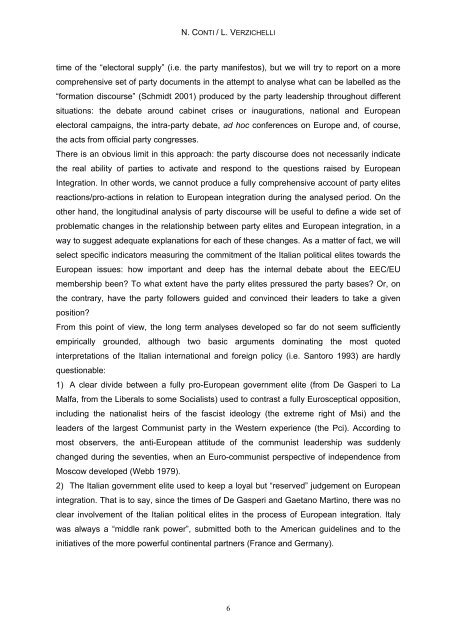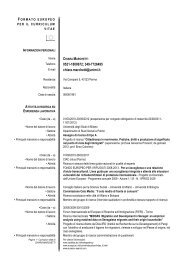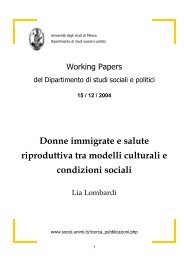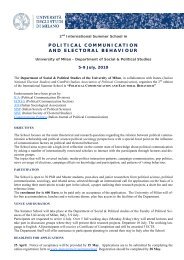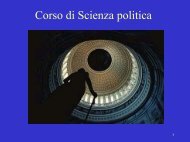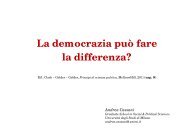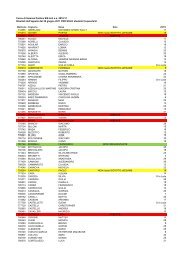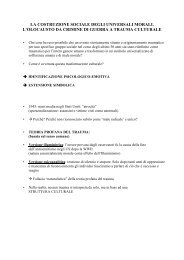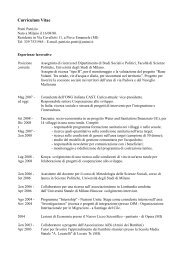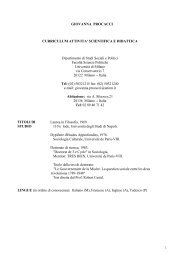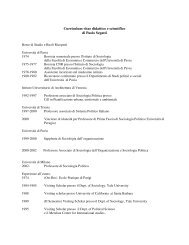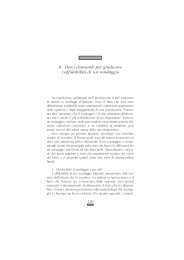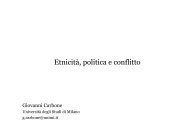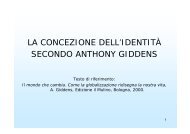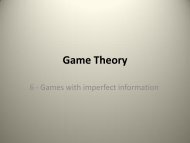The european dimension of political discourse in Italy. A ... - CIRCaP
The european dimension of political discourse in Italy. A ... - CIRCaP
The european dimension of political discourse in Italy. A ... - CIRCaP
You also want an ePaper? Increase the reach of your titles
YUMPU automatically turns print PDFs into web optimized ePapers that Google loves.
N. CONTI / L. VERZICHELLI<br />
time <strong>of</strong> the “electoral supply” (i.e. the party manifestos), but we will try to report on a more<br />
comprehensive set <strong>of</strong> party documents <strong>in</strong> the attempt to analyse what can be labelled as the<br />
“formation <strong>discourse</strong>” (Schmidt 2001) produced by the party leadership throughout different<br />
situations: the debate around cab<strong>in</strong>et crises or <strong>in</strong>augurations, national and European<br />
electoral campaigns, the <strong>in</strong>tra-party debate, ad hoc conferences on Europe and, <strong>of</strong> course,<br />
the acts from <strong>of</strong>ficial party congresses.<br />
<strong>The</strong>re is an obvious limit <strong>in</strong> this approach: the party <strong>discourse</strong> does not necessarily <strong>in</strong>dicate<br />
the real ability <strong>of</strong> parties to activate and respond to the questions raised by European<br />
Integration. In other words, we cannot produce a fully comprehensive account <strong>of</strong> party elites<br />
reactions/pro-actions <strong>in</strong> relation to European <strong>in</strong>tegration dur<strong>in</strong>g the analysed period. On the<br />
other hand, the longitud<strong>in</strong>al analysis <strong>of</strong> party <strong>discourse</strong> will be useful to def<strong>in</strong>e a wide set <strong>of</strong><br />
problematic changes <strong>in</strong> the relationship between party elites and European <strong>in</strong>tegration, <strong>in</strong> a<br />
way to suggest adequate explanations for each <strong>of</strong> these changes. As a matter <strong>of</strong> fact, we will<br />
select specific <strong>in</strong>dicators measur<strong>in</strong>g the commitment <strong>of</strong> the Italian <strong>political</strong> elites towards the<br />
European issues: how important and deep has the <strong>in</strong>ternal debate about the EEC/EU<br />
membership been? To what extent have the party elites pressured the party bases? Or, on<br />
the contrary, have the party followers guided and conv<strong>in</strong>ced their leaders to take a given<br />
position?<br />
From this po<strong>in</strong>t <strong>of</strong> view, the long term analyses developed so far do not seem sufficiently<br />
empirically grounded, although two basic arguments dom<strong>in</strong>at<strong>in</strong>g the most quoted<br />
<strong>in</strong>terpretations <strong>of</strong> the Italian <strong>in</strong>ternational and foreign policy (i.e. Santoro 1993) are hardly<br />
questionable:<br />
1) A clear divide between a fully pro-European government elite (from De Gasperi to La<br />
Malfa, from the Liberals to some Socialists) used to contrast a fully Eurosceptical opposition,<br />
<strong>in</strong>clud<strong>in</strong>g the nationalist heirs <strong>of</strong> the fascist ideology (the extreme right <strong>of</strong> Msi) and the<br />
leaders <strong>of</strong> the largest Communist party <strong>in</strong> the Western experience (the Pci). Accord<strong>in</strong>g to<br />
most observers, the anti-European attitude <strong>of</strong> the communist leadership was suddenly<br />
changed dur<strong>in</strong>g the seventies, when an Euro-communist perspective <strong>of</strong> <strong>in</strong>dependence from<br />
Moscow developed (Webb 1979).<br />
2) <strong>The</strong> Italian government elite used to keep a loyal but “reserved” judgement on European<br />
<strong>in</strong>tegration. That is to say, s<strong>in</strong>ce the times <strong>of</strong> De Gasperi and Gaetano Mart<strong>in</strong>o, there was no<br />
clear <strong>in</strong>volvement <strong>of</strong> the Italian <strong>political</strong> elites <strong>in</strong> the process <strong>of</strong> European <strong>in</strong>tegration. <strong>Italy</strong><br />
was always a “middle rank power”, submitted both to the American guidel<strong>in</strong>es and to the<br />
<strong>in</strong>itiatives <strong>of</strong> the more powerful cont<strong>in</strong>ental partners (France and Germany).<br />
6


